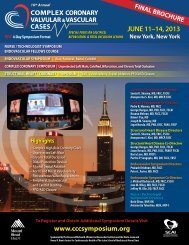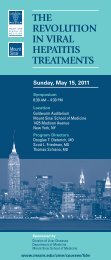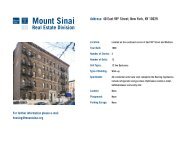Winter 2013 Newsletter - Mount Sinai Hospital
Winter 2013 Newsletter - Mount Sinai Hospital
Winter 2013 Newsletter - Mount Sinai Hospital
Create successful ePaper yourself
Turn your PDF publications into a flip-book with our unique Google optimized e-Paper software.
MSInteractions<br />
ISSUE<br />
<strong>Winter</strong><br />
<strong>2013</strong><br />
25th Edition<br />
Volume 10 (1)<br />
Dr. Fred Lubin<br />
A Word<br />
From<br />
Our<br />
Director<br />
AS WE ENTER THE<br />
winter months,<br />
notice the drop in<br />
temperature, the early<br />
darkness of evening,<br />
the end of one year<br />
and the beginning of<br />
another, it gives us<br />
time to review what<br />
has happened in 2012<br />
and what we can look<br />
forward to in <strong>2013</strong>.<br />
In this newsletter we<br />
say goodbye to <strong>Mount</strong><br />
<strong>Sinai</strong>’s former logos<br />
and welcome the<br />
new “branding” and<br />
renaming the Medical<br />
School, which is now<br />
the Icahn School of<br />
Medicine at <strong>Mount</strong><br />
<strong>Sinai</strong>, yet we will still<br />
be the <strong>Mount</strong> <strong>Sinai</strong><br />
Medical Center. You<br />
will soon see our<br />
cards and coats will<br />
signify this logo or<br />
“branding”change.<br />
We are debuting<br />
our own rebranding<br />
and initiating a new<br />
newsletter format.<br />
Please let us know<br />
what you think.<br />
— continued on page 2<br />
Dr. Aaron Miller<br />
Despite Sandy,<br />
Changing the Future<br />
Symposium a<br />
Resounding Success<br />
THE 4TH ANNUAL MULTIPLE SCLEROSIS SYMPOSIUM,<br />
“Changing the Future: New Trends in Multiple Sclerosis Research<br />
and Treatment,” presented by the Corinne Goldsmith Dickinson<br />
Center for MS, brought together the MS Center’s team with<br />
other clinicians, scientists, and healthcare professionals for<br />
a day-long review of the latest happenings in MS treatment,<br />
clinical trials, and future therapies.<br />
Despite concerns that Hurricane Sandy and the NYC Marathon<br />
might cause traffic and other delays, hundreds of interested<br />
MS patients, caregivers, and family members came out to the<br />
beautiful Grand Hyatt at Grand Central on November 4 th , 2012<br />
for the free event, which was cosponsored by the National MS<br />
Society, New York City-Southern NY Chapter (NMSS).<br />
Video of the event will be available on<br />
www.mountsinai.org/mscenter in the coming weeks.<br />
Guests began arriving around 8:00am to register and later to<br />
hear lectures that ranged from MS basics to potential future<br />
therapies in the pipeline. Several new treatment options are<br />
now or will soon be available, and our CGD physicians wanted to<br />
give attendees the most up-to date information available about<br />
these options.<br />
Dr. Aaron Miller, Medical Director of the CGD Center for MS,<br />
was again the program director of the Changing the Future<br />
Symposium and served as Master of Ceremonies. The first<br />
speaker was Michelle Fabian, MD, an MS attending physician<br />
at the CGD Center, who helped “break the ice” by providing a<br />
review of MS fundamentals.<br />
In her presentation MS: Back to the Basics, Dr. Michelle Fabian,<br />
continued on page 4<br />
Corinne Goldsmith Dickinson Center for Multiple Sclerosis • 5 East 98th Street, First Floor
continued from page 1<br />
The Hess Center for Science and Medicine<br />
officially opened its doors. It is touted to<br />
provide a new age of collaboration between<br />
researchers and practitioners that “can change<br />
the face of medicine.” This initiative highlights<br />
<strong>Mount</strong> <strong>Sinai</strong>’s efforts to optimize the skills and<br />
technological breakthroughs of those at<br />
<strong>Mount</strong> <strong>Sinai</strong> to investigate exciting possibilities<br />
in scientific research that might produce<br />
future promises and possible cures for all<br />
diseases, and for us in particular, the cure<br />
for multiple sclerosis.<br />
Our Keynote article presents a review and<br />
pictures of our Fourth Annual Symposium—<br />
Changing the Future: New Trends in Multiple<br />
Sclerosis Research and Treatment, which was<br />
held at the Hyatt Hotel at Grand Central, on<br />
Sunday, November 4, 2012. Despite Hurricane<br />
Sandy and a last minute cancellation of the<br />
NYC Marathon, the Symposium went on. The<br />
event was a particular success because of the<br />
challenges that it faced. The Symposium was<br />
co-sponsored by the National MS Society,<br />
New York City-Southern NY Chapter and,<br />
offered for free thanks to the generous<br />
support of educational grants from -- Acorda<br />
Therapeutics, Inc., EMD Serono Symposia USA,<br />
Inc., Genzyme, A Sanofi Company, Questcor<br />
Pharmaceuticals, Inc., and Teva Neuroscience,<br />
Inc. (Please see the article and pictures on<br />
pgs. 1,4-6).<br />
Another important lead item is the article<br />
about the second oral MS medication approved<br />
by the Food and Drug Adminstration, called<br />
Aubagio (please see p.7).<br />
We report recent fundraising events that<br />
have been intiated to bring more money into<br />
the CGD Center and continue to foster the<br />
collaborative model that defines who we are.<br />
True to this model, we do not make money<br />
precisely because our philosophy emphasizes<br />
the needs of the patient rather than the<br />
number of patients seen in a day. We are very<br />
A Word From Our Director<br />
dependent on the “kindness of strangers” as<br />
well as the kindness of those who know of our<br />
work or who have benefitted from the work<br />
that we do. In line with that, we are enclosing<br />
a donor envelope to provide an “easy” way<br />
for you to let us know how you feel. While<br />
everyone is grateful for a large donation, we<br />
also appreciate the smaller donations because<br />
they often represent a high percentage of the<br />
donor’s actual giving capacity. We give thanks<br />
for everyone’s support.<br />
Two other fundraising events occurred in<br />
September—The MS Hope for a Cure Poker<br />
Tournament and in October—The NMSS Bike<br />
Ride. The MS Hope for a Cure 8 th Poker<br />
Tournament did quite well and helps support<br />
research and educational programs and<br />
scholarships for individuals affected by MS.<br />
Please see the outcome of the event and Save<br />
the Date for next year—October 10, <strong>2013</strong>, (p.15).<br />
There is also a touching story from an MS<br />
patient’s husband, who talks about their 2012<br />
ride and what it means to him (pgs.10-11). Our<br />
own nurse practitioner, Gretchen Mathewson<br />
also participated in the MS Bike ride and<br />
reports on her adventures (p.8).<br />
On November 7 th , shortly after the Center’s<br />
Fourth Annual Symposium, Audrey Goldsmith<br />
Kubie debuted the First Annual Mah Jongg and<br />
Canasta Fundraiser. The article and pictures<br />
from this event are featured on p.9.<br />
The CGD Center’s 11 th Annual Dance Party—Save<br />
the Date—Thursday, March 14, <strong>2013</strong>—also begs<br />
your attention to come see what all the fun is<br />
about—please see the evite on p. 3.<br />
The NMSS Annual MS Walk will occur on<br />
Sunday, April 28 th , <strong>2013</strong>. We hope we can<br />
encourage many of you to join the <strong>Mount</strong> <strong>Sinai</strong><br />
CGD Team. Please note, there are many dates<br />
to keep in mind and mark down so you too can<br />
participate.<br />
2<br />
MSInteractions • <strong>Winter</strong> • <strong>2013</strong> <strong>2013</strong>
The Challenge Grant anonymously offered at<br />
the Tenth Annual Dance has almost reached its<br />
goal of $100,000—we are currently at $95,000.<br />
We thank all of you who have helped meet<br />
that challenge and help us double the monies<br />
offered to provide support for the work we<br />
are doing.<br />
In keeping with our regular features, we<br />
have the social workers’ tip of the month<br />
(see p.8). We list the After-Hours Seminars<br />
for the months January-May <strong>2013</strong>, which<br />
have been generously sponsored by Novartis<br />
Pharmaceuticals (p.16).<br />
We have congratulations to offer to Gretchen<br />
Mathewson, who passed her MS Certification<br />
exam (see p.8) and to Sabrina Phipps (p.12) for<br />
becoming certified as a medical assistant and<br />
for assuming new responsibilities in the Center<br />
to help with prescriptions and to triage medical<br />
issues directed toward the doctors and nurse<br />
practitioners. We also get to welcome the<br />
newest member of the CGD family. Christine<br />
Hannigan gave birth to CJ Alonso (please see<br />
his adorable picture on p.11).<br />
Another ”regular” feature, the CGD News<br />
Briefs, allows us to share the latest adventures<br />
and accomplishments of our CGD community<br />
(please see pgs. 6,7,10-11,13,16).<br />
We are always eager to hear your feedback.<br />
Please let us know features you might like to<br />
hear about or seminars you would like us to<br />
present. We are also trying to go “green” and<br />
would appreciate learning your email addresses<br />
so we can “effortlessly” let you know about<br />
upcoming talks and events. Please feel free to<br />
send us your email address—<br />
donna.polisar@mssm.edu<br />
Wishing you and yours a happy and healthy<br />
New Year.<br />
Fred D. Lublin, MD, FAAN<br />
Saunders Family Professor of Neurology<br />
Director, The Corinne Goldsmith Dickinson<br />
Center for Multiple Sclerosis<br />
Please<br />
join us<br />
for a<br />
fun filled<br />
evening<br />
<strong>Winter</strong> <strong>2013</strong> <strong>2013</strong> • MSInteractions<br />
• 3<br />
#<br />
#
Despite Sandy, Changing the Future<br />
Symposium a Resounding Success<br />
continued from page 1<br />
discussed common symptoms of multiple sclerosis, how<br />
it is diagnosed, what subtypes of MS exist, and pointed<br />
out some known risk factors for MS. Dr. Fabian reminded<br />
us that MS is the most common demyelinating disease of<br />
the central nervous system known today. While there is<br />
no known cause of MS, reflecting on current findings, Dr.<br />
Fabian said that out of all possible risk factors for MS, the<br />
only modifiable potential risk factors currently known are<br />
Vitamin D and smoking. There have been multiple studies<br />
associating smoking with the risk of a faster progression<br />
once a person has MS. Thus, the importance of MS patients<br />
quitting smoking remains paramount.<br />
Dr. Stephen Krieger, attending physician at the CGD MS<br />
Center at <strong>Mount</strong> <strong>Sinai</strong> and Assistant Professor of Neurology<br />
spoke next on MS: Mythbusters. Dr. Krieger described why<br />
it is very important for MS patients and families to get the<br />
best possible information and studies on MS There are<br />
many rumors and much misinformation in the world, partly<br />
thanks to the internet. In terms of why MS lends itself to<br />
myths, Dr. Krieger pointed out that the uncertainty and<br />
fear about MS leads to many half truths occupying the MS<br />
information landscape. One myth Dr. Krieger discussed<br />
was the myth that Aspartame, an artificial sweetener<br />
was an MS causing agent. While emails circled the world<br />
detailing the specifics of how Aspartame was the cause of<br />
one person’s MS, the truth was that studies did NOT show<br />
this correlation, and that this was most likely a marketing<br />
ploy by a rival artificial sweetener company to hurt<br />
Aspartame’s business. This is just one of several examples<br />
of misinformation. Dr. Krieger encouraged everyone to be<br />
vigilant in their research and to always talk to their doctors<br />
before making any decisions regarding changes in their<br />
treatment or routine, especially if driven by information not<br />
obtained from their doctor.<br />
Next, Dr. Patrizia Casaccia, Director of the Center for Myelin<br />
Repair in the Friedman Brain Institute at <strong>Mount</strong> <strong>Sinai</strong> and<br />
also Professor of Neuroscience, spoke about research in<br />
MS and asked whether the course can be modified. She<br />
focused on how breakthroughs in MS treatment were<br />
continued on page 5<br />
4<br />
MSInteractions • • <strong>Winter</strong> <strong>2013</strong>
possible through the study of genetics<br />
and understanding affected cell activity.<br />
Dr. Casaccia had several interesting and<br />
eye-opening videos that showed, on a<br />
cellular and molecular level, the process<br />
by which cells usually work and how MS<br />
breaks down that process, causing many<br />
symptoms and problems from which MS<br />
patients suffer. An important message<br />
she shared was that research in the field<br />
of myelin repair, and how manipulating<br />
cell functions will play a vital part in<br />
better understanding MS. Ultimately, she<br />
concluded we will be able to treat MS<br />
better and, even one day, prevent and<br />
cure it.<br />
Dr. John DeLuca, VP of Research for<br />
the Kessler Foundation and Professor of<br />
Physical Medicine at NMDNJ-New Jersey<br />
Medical School gave a very interesting<br />
presentation on an emerging area within<br />
MS treatment, Cognition in MS. Cognition<br />
generally refers to our brain’s ability to<br />
remember things (memory) and function<br />
normally (cognitive reasoning). For<br />
decades, during Dr. DeLuca’s professional<br />
career, he noted that MS researchers<br />
and doctors falsely believed that MS did<br />
not seriously affect cognitive function.<br />
Over the years, however, as research has<br />
progressed and our ability to test in this<br />
area has increased, research shows a<br />
large percentage of MS patients suffer<br />
a noticeable amount of damage in their<br />
cognitive abilities. Dr. DeLuca said that<br />
research and developments in this area<br />
would be a driving force for helping MS<br />
sufferers halt the damage being done<br />
to cognitive systems, and also allow for<br />
treatments to repair that damage as well.<br />
After a delicious complimentary lunch, Ilana<br />
Katz Sand, one of the CGD MS Center’s<br />
Sylvia Lawry MS Physician Fellows, spoke<br />
on Current Disease Modifying Therapies.<br />
Dr. Katz Sand highlighted the options<br />
available to treat various aspects of MS.<br />
This includes disease modifying therapies,<br />
of which there are 8 approved therapies to<br />
treat exacerbations, to improve recovery<br />
from exacerbations, to improve function,<br />
(such as walking speed), and symptoms.<br />
Her presentation was well received. Many<br />
knew some of the current treatment options<br />
available but before her talk had not had<br />
this comprehensive overview to look at and<br />
decide which treatment options were best<br />
for them individually.<br />
CGD MS Center Director and Saunders<br />
Family Professor of Neurology, Dr. Fred<br />
Lublin presented information concerning<br />
methods for treating progressive forms of<br />
MS. Dr. Lublin has seen thousands of MS<br />
patients and understands their desire for<br />
improved treatments. Dr. Lublin highlighted<br />
areas where research already has provided<br />
breakthroughs in our understanding and<br />
treatment of MS, such as the importance<br />
of immune function, the role of genetics<br />
in MS, environmental factors, reduction in<br />
potential infectious agents, new imaging<br />
advances and a renewed focus on myelin<br />
regeneration and repair. He pointed out<br />
that there is an international push to make<br />
forms of progressive MS one of their<br />
highest priorities. There is a worldwide<br />
effort to develop experimental models,<br />
study strategies, as well as symptom<br />
management and rehabilitation. It is vital<br />
to find funding to support more research.<br />
Aliza Ben-Zacharia, DrNP, Doctor of Nurse<br />
Practitioning at the CGD MS Center at<br />
<strong>Mount</strong> <strong>Sinai</strong>, provided a broad overview of<br />
MS symptoms and their management. MS<br />
symptoms are numerous and interrelated.<br />
She pointed out that treating the many<br />
symptoms of MS is as difficult a challenge<br />
as modifying the disease course itself.<br />
continued on page 6<br />
<strong>Winter</strong> <strong>2013</strong> • • MSInteractions<br />
5
Proper management of symptoms,<br />
especially neurological symptoms, can<br />
improve MS patients’ quality of life. She<br />
focused on how symptoms interact with<br />
each other. Sometimes patients can be<br />
caught in a “symptomatic cycle” in which<br />
fatigue may affect cognition and mood,<br />
which can lead to depression, and further<br />
promote fatigue and cognitive dysfunction,<br />
which may foster even more depression<br />
and fatigue. Her presentation focused on<br />
effective symptom management, which<br />
comes from a team approach.<br />
Our final presenter was the day’s Master<br />
of Ceremonies, Dr. Aaron Miller, Medical<br />
Director of the CGD MS Center and<br />
Professor of Neurology, who spoke on The<br />
Promise of Future Therapies. Dr. Miller<br />
discussed several drugs and treatment<br />
options that are currently being researched.<br />
Among them are better strategies to treat<br />
progressive MS, as Dr. Lublin had discussed.<br />
He also spoke about therapies to repair<br />
damage to the nervous system. The hope<br />
is that many of these breakthroughs are<br />
only a few years away from being brought<br />
to the market. Dr. Miller encouraged<br />
everyone to look into new clinical trial<br />
options and to consider taking part in this<br />
important area of discovery. This is an<br />
exciting time for MS therapeutics, with the<br />
hope for a considerable reduction in the<br />
risk for exacerbations and, a renewed focus<br />
on trying to develop better strategies for<br />
treating progressive disease.<br />
The Corinne Goldsmith Dickinson Center<br />
for MS acknowledges generous educational<br />
grants from the following companies.<br />
Without their support the day would not<br />
have been possible.<br />
• Acorda Therapeutics, Inc.<br />
• EMD Serono Symposia USA, Inc.<br />
• Genzyme, A Sanofi Company<br />
• Questcor Pharmaceuticals, Inc.<br />
• Teva Neuroscience, Inc.<br />
CGD NEWS BRIEFS<br />
Michelle Fabian, MD<br />
n Neurology Director – Humanities in<br />
Medicine program<br />
n Neurology Director – Neuroscience<br />
elective Clerkship<br />
n Brain and Behavior – Small group leader<br />
n Longitudinal Clinical Experience –<br />
Small group leader<br />
LET’S HEAR IT FOR THE GIRL!!<br />
In a newsletter in 2011, we talked about a<br />
patient, Ali Salama, who had been honored<br />
by the National Multiple Sclerosis Society<br />
(MS Interactions, Fall 2011—you can read<br />
it online). In that article, we showed her<br />
surrounded by shoes, for she is a fund raiser<br />
AND a fashionista.<br />
In addition to the work she has done and<br />
continues to do, she also has<br />
been involved in a Fox News<br />
segment with Dr. Miller.<br />
For <strong>2013</strong>, Ali promoted a<br />
Soul Cycle fund raiser for<br />
MS, Sunday Feb. 10th,<br />
<strong>2013</strong> at Soul Cycle East,<br />
East 83rd St. and 3rd Ave.<br />
Ali Salama’s Spin for MS<br />
Addendum: Her goal was $10,000 –<br />
she raised over $12,600!!!<br />
6<br />
MSInteractions • • <strong>Winter</strong> <strong>2013</strong>
Second Oral MS Medication<br />
AVAILABLE TO PATIENTS<br />
Teriflunomide (Aubagio®) became the second<br />
oral drug available for the treatment of relapsing<br />
forms of multiple sclerosis in the United States<br />
when it was approved by the U.S. Food and Drug<br />
Administration in September.<br />
Teriflunomide is a tablet administered once a day.<br />
The drug was approved in two dosage forms, 7 mg<br />
and 14 mg. However, the results of the two Phase<br />
3 trials, which led to the approval of the drug,<br />
indicated that the higher dose is more effective<br />
with little increase in side effects.<br />
In the first Phase 3 trial, known as TEMSO,<br />
the 14 mg dose showed a 31.5% reduction in<br />
the annualized relapse rate (average number<br />
of relapses per year) compared to placebo and<br />
a nearly 30% reduction in the development of<br />
sustained disability progression. Patients taking<br />
the higher dose of teriflunomide also experienced<br />
substantially less additional disease on MRI. In<br />
the second trial, known as TOWER, teriflunomide<br />
reduced the annualized relapse rate by 36.3% and<br />
disability progression by 31.5%.<br />
Teriflunomide was generally well tolerated.<br />
Some patients experienced gastro-intestinal<br />
side effects such as nausea and diarrhea, but this<br />
rarely was severe enough for them to discontinue<br />
participation in the trials. In addition, some<br />
patients reported mild hair thinning, which<br />
generally occurred early, with hair growing back<br />
even if the drug was continued. Patients who<br />
are treated with teriflunomide also need blood<br />
tests regularly to check for elevation of liver<br />
enzymes, which is seldom severe. The medication<br />
carries a Category X pregnancy rating, which<br />
means that women taking teriflunomide must<br />
practice effective contraception in order to avoid<br />
pregnancy while on the drug.<br />
steering committee that advised Genzyme (a<br />
Sanofi Company) during the development of<br />
teriflunomide. The CGD Center for MS has also<br />
participated in clinical trials of teriflunomide.<br />
Teriflunomide joins fingolimod as currently<br />
available oral agents for relapsing forms of MS.<br />
A third oral agent, currently known as BG-12, is<br />
expected to be approved by the FDA this spring.<br />
Dr. Fred Lublin, Director of the CGD Center for<br />
MS, commented, “Teriflunomide offers a valuable<br />
additional therapeutic option for the treatment<br />
of MS. Many patients will clearly prefer to take<br />
oral, rather than injectable, medications. With the<br />
expected approval of BG-12 in the first quarter of<br />
<strong>2013</strong>, we are excited to have so many possibilities<br />
to discuss with our patients.”<br />
CGD NEWS BRIEFS<br />
Aaron E. Miller, MD<br />
n His younger daughter, Caroline,<br />
was Admitted to the Bar<br />
n International Risk Management<br />
Meeting-Paris<br />
n Pharmaceutical All-day Teaching<br />
at the Center<br />
n ECTRIMS—International MS Meeting<br />
in Lyon, France<br />
n Patient Friends & Family Event at MSSM,<br />
Oct 23rd<br />
n Phenotype Meeting in Washington, DC<br />
n He was on FOX News<br />
Dr. Aaron Miller, Medical Director of the CGD<br />
Center for MS, served as a member of the<br />
<strong>Winter</strong> <strong>2013</strong> • • MSInteractions<br />
7
Gretchen Matewson, NP<br />
CONGRATULATIONS,<br />
GRETCHEN!!<br />
8<br />
Gretchen has participated<br />
in two important events<br />
since our last newsletter.<br />
She has successfully passed<br />
the International MS<br />
Nurses exam and is now<br />
an officially Certified MS<br />
Nurse Practitioner. Yeah,<br />
Gretchen.<br />
Gretchen’s second feat was<br />
to ride with her husband<br />
Tom in the NY MSSM Bike<br />
Ride, along with many<br />
friends and neighbors and<br />
rode 30 miles. In addition<br />
to raising $1500, she<br />
reports that the ride proved<br />
fabulous and inspirational.<br />
MSInteractions • <strong>Winter</strong> <strong>2013</strong><br />
SOCIAL WORKERS’<br />
TIP OF THE MONTH:<br />
A Resource Guide for<br />
Getting Around New York<br />
A patient recently brought to our attention a guide<br />
that is distributed by the Mayor’s Office for People<br />
with Disabilities (thanks Bob!). It lists all the accessible<br />
accommodations, site seeing, arts and entertainment,<br />
museums, dining, nightlife and sports. Although the<br />
guide is being updated and hard copies are no longer<br />
available- you can print the guide or obtain all the<br />
information on the website:<br />
www.nyc.gove/html/mopd/downloads/pdf/accessibility_<br />
guide.pdf.<br />
Their phone number is 212-788-2830 if you have any<br />
questions.<br />
One great tip, for example, while accessible taxi’s can be<br />
hailed on the street, there is a phone number that can be<br />
Lorem called ipsum to avoid dolor sit a amet, potential consectetur long adipiscing wait. The elit. feedback Integer enim we<br />
ipsum, have aliquam heard elementum is that you semper can non, generally dignissim get vitae one neque. within Etiam 10<br />
rhoncus, minutes diam if you in sagittis call dictum, 311 or 212-639-9675, elit lectus auctor diam, or the non Taxi porttitor and<br />
tortor massa vitae nibh.<br />
Limousine Commission directly at 718-666-4067.<br />
Duis mattis, nisl at iaculis commodo, dui elit consectetur tellus, nec<br />
malesuada sem dui vulputate urna. Aliquam vel mi nulla. In pellentesque<br />
mauris et leo commodo at tempus enim venenatis.
1ST<br />
ANNUAL MAH JONGG<br />
AND CANASTA<br />
BENEFIT LUNCHEON<br />
ON NOVEMBER 7 TH , 2012<br />
nearly a hundred guests<br />
attended the first CGD<br />
Mah Jongg and Canasta<br />
Benefit Luncheon at the<br />
Yale Club in Manhattan,<br />
New York City. This first<br />
Audrey Goldsmith Kubie<br />
time event was done in<br />
cooperation with the CGD MS Center and<br />
<strong>Mount</strong> <strong>Sinai</strong> Special Events and was chaired<br />
by Mrs. Audrey Kubie, who is an MS Center<br />
Advisory Board Member and daughter to<br />
one of our Center’s benefactors, Mr. Clifford<br />
Goldsmith. It was a very special event.<br />
This unique fundraiser brought together<br />
experienced and beginner Mah Jongg and<br />
Canasta Players to play in both games<br />
in a beautiful environment. All proceeds<br />
benefitted the CGD Center for MS. All<br />
funds raised will be used to improve further<br />
our patient care.<br />
Before the games began, CGD Center<br />
Director, Dr. Fred Lublin and Medical<br />
Director, Dr. Aaron Miller spoke to guests<br />
about the Center. They thanked everyone<br />
for their participation of this debut initiative<br />
and for their support of MS research and<br />
treatment. Mr. Clifford Goldsmith and his<br />
wife, Katherine were also in attendance at<br />
the event (please see their pictures below).<br />
In addition to<br />
playing some<br />
intense and<br />
challenging<br />
Mah Jongg<br />
and Canasta<br />
matches among<br />
friends, guests<br />
were also<br />
treated to a<br />
special plated<br />
lunch from the Yale Club. Throughout<br />
the games, guests were able to take part<br />
in some “retail therapy” offered by DKF<br />
Limited, who had brought trunks full of<br />
their finest boutique items for everyone<br />
to peruse and purchase. A percentage<br />
of sales were donated to the CGD MS<br />
Center. As if that were not enough, event<br />
chair Audrey Kubie organized an elaborate<br />
Silent Auction that offered dozens of lovely<br />
gifts and Mah Jongg merchandise being<br />
auctioned for unbelievably low prices.<br />
These gifts were<br />
all contributed<br />
by companies<br />
and individuals<br />
who were eager<br />
to support the<br />
CGD MS Center.<br />
Efforts such as<br />
this one help<br />
garner monies<br />
to provide<br />
resources for<br />
Dr. Fred Lublin, Audrey Goldsmith Kubie,<br />
Dr. Aaron Miller<br />
The Yale Club prior to festivities<br />
treating patients with MS and conducting<br />
research to find a cure for MS in the near<br />
future. All of the funds from the Silent<br />
Auction and ticket sales were donated<br />
to the CGD Center and we are extremely<br />
grateful to everyone who attended,<br />
donated their time, materials or energy,<br />
and supported the first Annual Mah Jongg<br />
and Canasta Luncheon in any way. We look<br />
forward to starting a tradition and having<br />
an even better turn out next year!<br />
Alexandra Goldsmith Fallon, Katherine Goldsmith, Clifford Goldsmith,<br />
Audrey Goldsmith Kubie<br />
<strong>Winter</strong> <strong>2013</strong> • MSInteractions<br />
9
MS Bike Ride-Oct. 21, 2012<br />
ONE PARTNER’S STORY<br />
By Richard Pieper<br />
Dr. Fred Lubin<br />
CGD NEWS BRIEFS<br />
Fred D. Lublin, MD<br />
n Monthly Journal Club<br />
with Residents<br />
n University of Florida—CME<br />
Course Director<br />
n Barcelona MS Workshop<br />
n AAN Mentoring<br />
n International Risk<br />
Management Meeting-Paris<br />
n Pharmaceutical All-day<br />
Teaching at the Center<br />
n EJ’s Poker Tournament -<br />
October 4 th<br />
n ECTRIMS—International<br />
MS Meeting in Lyon, France<br />
n Patient Friends & Family Event<br />
at MSSM, Oct 23 rd<br />
n Phenotype Meeting in<br />
Washington, DC<br />
n NMSS Federal Activism in<br />
Washington ,DC<br />
n Piper Jaffrey 24 th Annual<br />
Healthcare Conference Panel<br />
n Charcot Meetings in<br />
Marbella, Spain<br />
Merrill Hesh and Richard Pieper of the<br />
Vicious Cyclers<br />
WHEN I TAKE A MOMENT<br />
to sit down, and empty my<br />
mind of the persistent calls<br />
of chores and work, I feel<br />
immense gratitude for the<br />
past year. I am grateful that,<br />
with medication, my wife’s<br />
MS has been “quiescent;”<br />
I am grateful that our<br />
children have been loving<br />
and understanding of her<br />
struggle; I am grateful that<br />
Merrill (Hesch) has been<br />
so determined and fiercely<br />
focused on her exercise<br />
and physical therapy; and I<br />
am grateful that our friends<br />
have been so supportive of<br />
Merrill’s efforts to regain<br />
mobility and maintain a<br />
positive spirit. Those who<br />
are reading should consider<br />
this a heartfelt “Thank You.”<br />
This past weekend Merrill and I rode 27 miles here in the City,<br />
making our way under the bridges and down the East River<br />
Esplanade, picking a path through the throngs that clogged<br />
the sidewalks in Battery Park, where the bike path has not<br />
yet been completed, and then cruising up the Hudson River<br />
Park bikeway to 57 th Street, where we crossed to Columbus<br />
Circle and on into Central Park. Merrill is completely alive on<br />
her bike, and only when she dismounts can you notice the<br />
irregularity in her gait as she pushes it beside her.<br />
On Sunday when we rode we stopped for a moment as we<br />
entered the corner of the Park. The sun was raking the pylon<br />
of Magonigle’s Maine Memorial, and always the conservator,<br />
I remarked on the failure of the resin-based composites that<br />
had been applied to the Tennessee pink limestone. It was<br />
a beautiful day, and the Park drive was alive with cyclists,<br />
10<br />
MSInteractions • • <strong>Winter</strong> <strong>2013</strong>
pedicabs, carriages, and strollers competing<br />
for a clear path. Before setting out again<br />
Merrill and I agreed to meet at “our spot” on<br />
the lawn by the small lake at the edge of the<br />
Park near 102nd Street.<br />
Merrill found me there lying on the lawn near<br />
a sketching class, by a bench where a couple<br />
from Brazil on holiday with their young<br />
daughter sat resting from their own bike<br />
ride. I offered to take their photo together,<br />
and after the father inquired where we were<br />
from, I remarked that Merrill and I had first<br />
stopped on our bicycles at this spot the<br />
summer we met in 1979. “A good history” he<br />
said in halting English.<br />
As we talked, a young sleep-deprived<br />
woman with six-month old boy-girl twins<br />
came and sat at the bench next to us. Merrill<br />
engaged her in conversation, remarking that<br />
we had boy-girl twins as well, but noting that<br />
she hardly remembered the early years; she<br />
had been so perpetually tired that the time<br />
was just a blur. I smiled at the reminder that<br />
periodically life presents us with challenges<br />
that we confront, adapt to, survive, and move<br />
beyond, and then years later can scarcely<br />
recall. Looking back at the past five years, I<br />
feel as if we have emerged at the other end<br />
of a long tunnel; we are back in the sunlight<br />
now, and can hardly remember the times in<br />
the dark.<br />
Thank you for your friendship and support.<br />
FUNDRAISING UPDATE—Merrill and her<br />
husband, Richard, are members of the<br />
Vicious Cyclers. Thanks to many visiting girl<br />
friends from Ithaca, Albany, Cold Spring,<br />
and Rye, as well as NYC, the Vicious Cyclers<br />
raised $22,728 and were the 7 th team in the<br />
Friends and Family Category. Richard raised<br />
$1,480 and Merrill raised $6,370. Now Merrill<br />
reports riding once a weekend—marathon<br />
or not—30 miles from home to Central Park,<br />
around twice and home. She says the ride is<br />
a joy for her. She is even loading up on cycle<br />
wear for the winter months.<br />
CGD NEWS BRIEFS<br />
Sylvia Klineova, MD<br />
n Passed her Neurology Boards and is now a<br />
Board Certified Neurologist<br />
n She is taking a Masters in Clinical Research at<br />
the Icahn School of Medicine at <strong>Mount</strong> <strong>Sinai</strong><br />
Gretchen Mathewson, NP<br />
n Finished her 6 mos. Dystel Nursing Fellowship<br />
and has started working full-time as of<br />
Dec 1, 2012<br />
Please Welcome the Newest Member<br />
of the CGD Family<br />
Christopher Joseph Alonso, affectionately nicknamed, CJ,<br />
was born on 8/22/12 at 4:59pm. The proud parents are<br />
Christine Hannigan, one of our Senior Research Coordinators,<br />
and Chris Alonso—everyone is some form of Chris. He<br />
weighed 7lbs, 1oz and was 20” long. Despite being wiped out<br />
in Hurricane Sandy, the family is doing well and is buoyed by<br />
their happy little bundle of joy. We all wish them well.<br />
<strong>Winter</strong> <strong>2013</strong> • • MSInteractions<br />
11
CGD FACULTY PRESENTS<br />
At the Consortium of Multiple Sclerosis Centers<br />
(CMSC) Meeting and the European Committee<br />
for Treatment and Research in Multiple Sclerosis<br />
(ECTRIMS) Congress in 2012<br />
By Stephen Krieger, MD<br />
In June 2012, faculty of the<br />
CGD Center for MS made<br />
several presentations at the<br />
Annual Consortium of Multiple<br />
Sclerosis Centers (CMSC)<br />
Meeting, held this past year<br />
in San Diego, California.<br />
Several presentations of<br />
results from Dr. Fred Lublin’s<br />
CombiRx clinicial trial (which<br />
compared Avonex, Copaxone,<br />
and the combination of the<br />
two medicines together)<br />
were made at CMSC. The<br />
top-line results – that either<br />
medicine alone was as good<br />
as the combination of the<br />
two medicines at preventing<br />
MS relapses -- had been<br />
presented previously at<br />
the AAN Meeting in April<br />
2012. At CMSC, Dr. Lublin’s<br />
collaborator Dr. Stacy<br />
Cofield presented new<br />
information from this trial<br />
evaluating Qualify of Life for<br />
patients treated with these<br />
medications, finding that<br />
these important outcomes<br />
remained remarkably stable<br />
for the great majority of<br />
patients over the 3-year<br />
duration of the trial.<br />
Other presentations of<br />
the CombiRx data by Dr.<br />
Lublin’s collaborator Dr. Jerry<br />
Wolinsky looked at novel ways<br />
of using MRI scans to predict<br />
clinical outcomes for patients,<br />
as well as new techniques<br />
for evaluating how MS<br />
medications can prevent the<br />
loss of brain volume known<br />
as brain atrophy. Members<br />
of the CGD faculty and staff<br />
including Dr. Lublin and CGD<br />
Research Manager Tarah<br />
12<br />
PLEASE MEET<br />
Sabrina Phipps,<br />
Certified MA<br />
(Medical Assistant)<br />
Sabrina Phipps has been with <strong>Mount</strong> <strong>Sinai</strong><br />
since 1996. She started in the department<br />
of Surgery and became a medical assistant<br />
for the Department of Neurology, Division<br />
MSInteractions • • <strong>Winter</strong> <strong>2013</strong><br />
of Movement Disorders in 1999. When<br />
Movement Disorders moved down to the<br />
first floor of 5 East 98 th Street, she was<br />
“shared” by the Division of Movement<br />
Disorders and the MS Center. In 2012, both<br />
Centers—the Robert and John Bendheim<br />
Center for Parkinsons & Movement<br />
Disorders and the Corinne Goldsmith<br />
Dickinson Center for Multiple Sclerosis<br />
realized we each needed our own MA. As<br />
a result, Sabrina became dedicated to the<br />
needs of the MS patients. In her new role,<br />
she went to school and became a certified<br />
MA—Congratulations to her. She is now in
Gustafson ran a well-attended<br />
symposium called “MS Clinical<br />
Trials: From Inception to<br />
Closeout.” This symposium<br />
was created to present to<br />
other clinical researchers<br />
and investigators across the<br />
country some of the crucial<br />
lessons learned from running<br />
the CombiRx trial. In this way,<br />
Dr. Lublin and the CombiRx<br />
team were able to share new<br />
insights regarding how to best<br />
design and perform clinical<br />
trials in MS, to maximize other<br />
researchers’ ability to arrive<br />
at clinically meaningful results<br />
that can better the lives of<br />
people with MS.<br />
Also at CMSC, Dr. Krieger<br />
presented a platform<br />
presentation “Emergency<br />
Department Visits Before<br />
the Diagnosis of Multiple<br />
Sclerosis” on behalf of a<br />
CGD research team including<br />
Dr. Rebecca Farber (our<br />
<strong>2013</strong> MS fellow), colleague<br />
Dr. Megan Alcauskas,<br />
and research coordinator<br />
Christine Hannigan. This<br />
project examined visits to<br />
the Emergency Department<br />
made by patients before they<br />
were found to have MS, and<br />
revealed that in close to 40%<br />
of patients the diagnosis<br />
of MS was not made at the<br />
time of the initial symptoms.<br />
The presentation concluded<br />
that ED visits for neurologic<br />
symptoms are an important<br />
opportunity to diagnose and<br />
treat a first attack of MS, and<br />
there is room to make the<br />
diagnosis even more rapidly.<br />
Dr. Corey McGraw, our 2012<br />
fellowship graduate, along<br />
with Dr. Krieger also presented<br />
a poster with an update on<br />
“The Food Critic Who Couldn’t<br />
Taste and Eight Other Cases<br />
of Dysgeusia in Multiple<br />
Sclerosis.” This project<br />
continued our evaluation<br />
of “loss of taste” as a rare<br />
symptom of MS, and refined<br />
our finding that this symptom<br />
results from an MS lesion in<br />
a very particular part of the<br />
brainstem responsible for<br />
conveying taste information<br />
to the brain. Encouragingly,<br />
most cases of this symptom<br />
resolve completely.<br />
On the educational front, Dr.<br />
Lublin co-chaired and Drs.<br />
Miller and Krieger joined as<br />
teaching faculty an annual<br />
educational program called<br />
MASTER-MS, designed for<br />
young neurologists interested<br />
in learning more about care<br />
and research in MS. This twoday<br />
symposium at the start of<br />
the CMSC meeting provided a<br />
terrific cutting-edge overview<br />
for 30 people entering our<br />
field. Finally, DrNP Aliza Ben-<br />
Zacharia and Dr. Krieger ran a<br />
two-part educational program<br />
on “Clinical Neuroanatomy in<br />
Multiple Sclerosis” for nurses,<br />
physician assistants, physical<br />
therapists and other allied<br />
health members dedicated<br />
to caring for people with<br />
multiple sclerosis. Dr. Krieger<br />
was honored and humbled<br />
to find that Dr. John Kurtzke,<br />
a pioneer in the field of MS<br />
research, attended<br />
this program.<br />
continued on page 14<br />
charge of answering the prescription calls<br />
and for triaging calls meant for the doctors,<br />
nurses and social workers. She also helps<br />
out by obtaining prior authorizations. We<br />
are lucky to have her and we know you<br />
have probably already felt her big smile<br />
when you call her line and speak with her.<br />
CGD NEWS BRIEFS<br />
Stephen Krieger, MD<br />
n Challenges of Relapse Management—<br />
MSAA—Sept 2012<br />
n PRIME Live Training Practicum—Sept 2012<br />
n Keynote speech about<br />
Community Health for NMSS—Abyssinian<br />
Baptist Church, NY—Sept. 2012<br />
n Chair AAN Education Committee—Oct. 2012<br />
n Ectrims Poster with Dr. Katz Sand—Oct. 2012<br />
n CGD 4th Annual Symposium at the Grand<br />
Hyatt—Nov. 2012<br />
n PRIME MS CME Program—Nov. 2012<br />
n Projects in Knowledge—AAN Highlights 2012<br />
n Consortium of MS Centers (CMSC)—online<br />
CME Course<br />
<strong>Winter</strong> <strong>2013</strong> • • MSInteractions<br />
13
continued from page 13<br />
The faculty from the CGD<br />
Center was also active at this<br />
year’s European Committee<br />
for Treatment and Research in<br />
Multiple Sclerosis (ECTRIMS)<br />
Congress, in October 2012.<br />
Held in Lyon, France, this<br />
meeting attracted 6,800<br />
attendees from across<br />
Europe and the world, and<br />
was the second-largest MS<br />
conference on record. The<br />
scientific program was a very<br />
full one, including platform<br />
sessions with state-of-theart<br />
topical reviews followed<br />
by presentations of new<br />
research. Platform sessions<br />
were well-attended as were<br />
the poster sessions held on<br />
two consecutive days.<br />
In a packed platform<br />
presentation, Dr. Lublin’s<br />
colleague Dr. Gary Cutter<br />
gave a talk based on the<br />
CombiRx trial described<br />
above, examining the numbers<br />
of patients who had relapses<br />
or developed permanent<br />
changes on their neurological<br />
examination due to MS during<br />
the 3-year trial. Results were<br />
encouraging: all patients in<br />
the trial were treated with<br />
Copaxone, Avonex, or both<br />
medicines, and over 60% did<br />
not have even one relapse.<br />
Furthermore, over 80% of<br />
patients did not develop new<br />
permanent neurologic signs<br />
(lasting more than a year) by<br />
the end of the 3-year study.<br />
Dr. Lublin also presented a<br />
second talk on MS relapses<br />
in the CombiRX trial, and<br />
showed that how relapses<br />
are defined and considered<br />
by clinicians and researchers<br />
have important implications<br />
for clinical trial results and, in<br />
turn, patient care. This study<br />
emphasizes the importance<br />
of precision when considering<br />
possible relapses in MS clinical<br />
trials, just as it is important for<br />
us to consider new symptoms<br />
carefully (and examine our<br />
patients promptly) when<br />
determining if one of our<br />
patients may need treatment<br />
for an MS relapse.<br />
Dr. Aaron Miller presented<br />
a poster on behalf of a<br />
research group at the CGD<br />
Center including research<br />
coordinator Colleen Farrell,<br />
looking at use of glatiramer<br />
acetate (Copaxone) among<br />
women during pregnancy.<br />
As Dr. Miller notes, women<br />
who desire pregnancy while<br />
taking disease-modifying<br />
agents face a dilemma. If they<br />
discontinue medication prior<br />
to attempting to conceive,<br />
they will lose drug protection.<br />
However, continuing<br />
medication may have risks to<br />
the fetus. Because Copaxone<br />
has a Category B rating, we<br />
have at times suggested<br />
that women consider<br />
remaining on Copaxone while<br />
attempting conception and<br />
during pregnancy. Dr. Miller<br />
found that the majority of<br />
44 women in his practice to<br />
whom he offered this option<br />
chose to remain on Copaxone<br />
during conception and<br />
pregnancy, and that outcomes<br />
were similar to pregnancies<br />
14<br />
Please Join Us in<br />
Wishing Stacy Well<br />
It is with mixed emotions that we<br />
announce that our beloved Stacy Ann<br />
Foster—the CGD Ambassador of the<br />
front desk is leaving <strong>Mount</strong> <strong>Sinai</strong>, as<br />
of January 9 th , <strong>2013</strong>-- to pursue her<br />
nursing career. While we are pleased<br />
MSInteractions • • <strong>Winter</strong> <strong>2013</strong><br />
for her and ask you to join us in wishing her well,<br />
please be patient with the person who must try to<br />
provide a similar presence. We all wish her well<br />
and hope she will keep in touch with us. Stacy<br />
started with <strong>Mount</strong> <strong>Sinai</strong> and the CGD Center in<br />
September 2005. We have appreciated ALL that she<br />
has done to make this Center such a special place.<br />
We know she will do well in her future endeavors.<br />
Addendum:<br />
Stacy wants you to know collectively, that she will<br />
miss everyone and apologizes if she did not have the<br />
opportunity to say goodbye individually.
in the general population. His study<br />
concluded that the results (in this limited<br />
number of patients) suggest that with<br />
sufficient counseling, Copaxone may be<br />
safely continued during pregnancy.<br />
CGD faculty presented two other posters<br />
at ECTRIMS. Dr. Corey McGraw (on behalf<br />
of a team including Dr. Miller, MRI expert<br />
Dr. Matilde Inglese, and Christine Hannigan)<br />
presented the results of a study conducted<br />
entirely at the CGD Center, looking at the<br />
safety of the Herpes Zoster Vaccine in<br />
Patients with Multiple Sclerosis. With a group<br />
of 19 patients over the age of 50 in whom the<br />
Zoster vaccine is FDA-approved, Dr. McGraw<br />
found that there were no MS relapses in the<br />
3 months following the vaccine, and there<br />
were no new MS lesions seen on MRI after<br />
the vaccinations. Dr. McGraw concluded that<br />
the study suggests that this vaccine may be<br />
safely administered to people with MS.<br />
Finally, MS Fellow Dr. Ilana Katz Sand and<br />
Dr. Krieger co-presented on behalf of a<br />
CGD research group including Dr. Miller<br />
and Colleen Farrell the results of a project<br />
titled “Diagnostic Uncertainty During the<br />
Transition to Secondary Progressive Multiple<br />
Sclerosis.” Many patients are interested<br />
in knowing “what type” of MS they have,<br />
including categories like Relapsing Remitting<br />
MS (RRMS) and Secondary Progressive MS<br />
(SPMS). These categories, however, are very<br />
subjective, and clinicians are often reluctant<br />
to answer this question decisively. This study<br />
looked back at the charts of 123 patients<br />
followed at our Center for over 8 years,<br />
and found that there is indeed uncertainty<br />
in how these diagnostic categories should<br />
be applied, and it can take many years<br />
for Secondary Progressive MS to become<br />
evident. Drs. Katz Sand and Krieger were<br />
pleased to be interviewed by French<br />
television talking about the poster (although<br />
they did not attempt to do so in French).<br />
In discussing the poster, Dr. Krieger said he<br />
favors using these terms as adjectives to help<br />
describe a person’s course of MS, rather than<br />
definitive categories.<br />
Taken together, it was a busy Summer and<br />
Fall of 2012 for research at the CGD Center<br />
for MS. With numerous projects both large<br />
and small still underway, <strong>2013</strong> promises to<br />
see further productivity as we seek answers<br />
to questions about multiple sclerosis, and to<br />
improve our understanding for the benefit of<br />
our patients.<br />
TEXAS HOLD’EM<br />
Charity Poker Tournament to<br />
Benefit Multiple Sclerosis<br />
RAISED OVER<br />
$1 MILLION<br />
Please Join Us for<br />
the <strong>2013</strong> MS Walk<br />
The MS walk is on Sunday, April 28, <strong>2013</strong>.<br />
We are hoping for spring weather.<br />
Please go online and sign up to join the<br />
MOUNT SINAI CGD Center for MS –<br />
the link is - www.nationalmssociety.org<br />
Save the Date for next year—October 10, <strong>2013</strong><br />
Please walk with us and raise money for<br />
a great cause – our goal is $45,000 to<br />
make us a top-tier team!<br />
<strong>Winter</strong> <strong>2013</strong> • • MSInteractions<br />
15
The Corinne Goldsmith Dickinson Center for Multiple Sclerosis<br />
After-Hours Seminars <strong>2013</strong><br />
Fourth Wednesday of Each Month (** Except Where Noted)<br />
5:30-7:00 PM, Annenberg 20-01—20 th floor • (1468 Madison – 100th & Madison)<br />
DATE TOPIC SPEAKERS<br />
January 23 rd Update on Current & Future Treatments for MS Dr. Aaron E. Miller<br />
February 27 th How to Understand MS Research Better Dr. Fred D. Lublin<br />
March 28 th** Basic Research: Trying to Cure the Dr. Patrizia Casaccia<br />
(Thursday) Progressive Phase of the Disease<br />
with her research team<br />
April 24 th Understanding Your Diet: Myth vs Reality Dr. Aliza Ben-Zacharia<br />
& Gretchen Mathewson<br />
May 22 nd The Gut-Brain Connection: Dr. Patrizia Casaccia<br />
Disease Manifestation & Response to Treatment with her research team<br />
Free to Attend—Light refreshments provided<br />
Please call 212-241-7958 to reserve a spot<br />
We’re going green, and will not be sending flyers in the mail.<br />
Please save this list for future reference.<br />
Sponsored by Novartis Pharmaceuticals<br />
If you would like to be notified via e-mail,<br />
PLEASE send your e-mail address to:<br />
donna.polisar@mssm.edu<br />
MS Interactions<br />
A quarterly publication of the<br />
Corinne Goldsmith Dickinson<br />
Center for Multiple Sclerosis<br />
5 East 98th Street<br />
New York, NY 10029<br />
Complimentary<br />
Subscriptions<br />
Call 212-241-6854, option 6<br />
If you are not receiving a<br />
copy and want to be on our<br />
mailing list PLEASE give us a<br />
call and let us know – we are<br />
happy to add you to our<br />
mailing list<br />
How to Donate:<br />
Development Office<br />
212-659-8500<br />
Comments & Questions:<br />
Donna Polisar, PhD<br />
CGD Center Administrator<br />
212-241-6854, option 6<br />
www.mountsinai.org/mscenter<br />
Ilana Katz Sand, MD<br />
n Presented a poster at ECTRIMS<br />
n Submitted an abstract for a poster at<br />
AAN as well as applied for fellow award<br />
to attend AAN meeting in March<br />
n Wrote an article for Continuum<br />
Aliza Ben-Zacharia , DrNP<br />
n Co-chaired an international Global<br />
nursing meeting of 400 nurses in<br />
Barcelona, Spain – 11/2012<br />
n Presented a program about the immune<br />
system in MS & emerging therapies in MS<br />
n 5th year chair of the communication/web<br />
site of the IOMSN organization<br />
n Wrote an article about palliative care in MS<br />
n Working on several research projects<br />
CGD NEWS BRIEFS<br />
n Working on several research projects:<br />
• ARMS trial with Dr. Miller<br />
• Applying for an NMSS pilot grant<br />
• Designing an NMO trial with<br />
Dr. Fabian<br />
• Working on a genetics paper with Drs.<br />
Sealfon, Chikina and Gerald<br />
n Wrote an article Good Moves Case<br />
Challenges in Managing Mobility in<br />
Multiple Sclerosis CME Aliza Bitton<br />
Ben-Zacharia, DNP, ANP-BC, MSCN<br />
CME Released: 09/19/2012; Valid<br />
for credit through 09/19/<strong>2013</strong><br />
n Developed a program for nurses<br />
evaluating suboptimal response and<br />
promoting outcomes in MS with current<br />
and emerging therapies presented via<br />
multiple teleconference for 350 nurses<br />
Corinne Goldsmith Dickinson Center for Multiple Sclerosis • 5 East 98th Street, First Floor


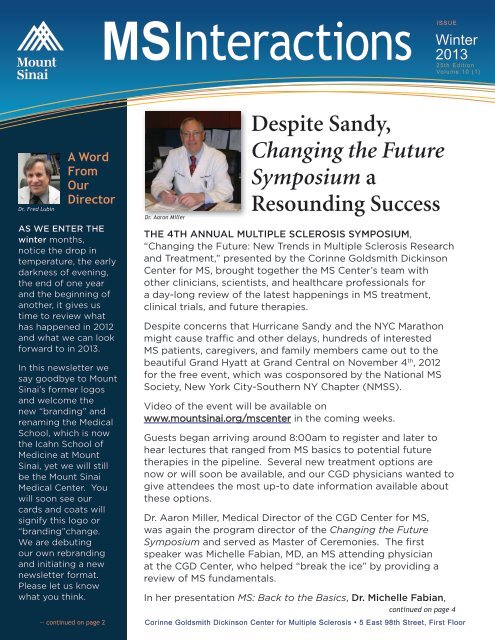
![December 2, 2012 [PDF] - Mount Sinai Hospital](https://img.yumpu.com/51092274/1/190x245/december-2-2012-pdf-mount-sinai-hospital.jpg?quality=85)
![January 21, 2013 [PDF] - Mount Sinai Hospital](https://img.yumpu.com/50916550/1/190x245/january-21-2013-pdf-mount-sinai-hospital.jpg?quality=85)
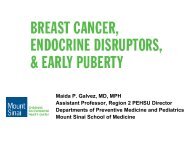
![February 3, 2013 [PDF] - Mount Sinai Hospital](https://img.yumpu.com/50584982/1/190x245/february-3-2013-pdf-mount-sinai-hospital.jpg?quality=85)
![March 18, 2012 [PDF] - Mount Sinai Hospital](https://img.yumpu.com/50462098/1/190x245/march-18-2012-pdf-mount-sinai-hospital.jpg?quality=85)
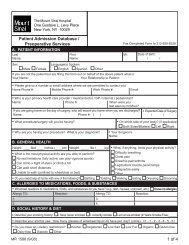
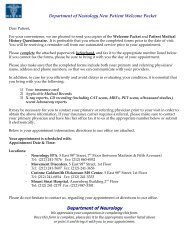
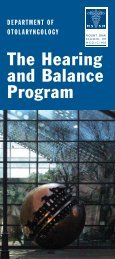
![Partners Program Guide [PDF] - Mount Sinai Hospital](https://img.yumpu.com/49411954/1/190x245/partners-program-guide-pdf-mount-sinai-hospital.jpg?quality=85)
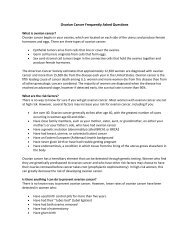
![March 19 - April 1, 2012 [PDF] - Mount Sinai Hospital](https://img.yumpu.com/48990923/1/190x245/march-19-april-1-2012-pdf-mount-sinai-hospital.jpg?quality=85)
![PGY-1 Residency Application [PDF] - Mount Sinai Hospital](https://img.yumpu.com/48577701/1/190x245/pgy-1-residency-application-pdf-mount-sinai-hospital.jpg?quality=85)
